4/22 blog update racing through Congo, DRC to get to Angola
Just finished doing laundry and we are taking a day off from driving at a beach just south of Ambriz, 200 km north of Luanda.
We made it to Angola from Franceville in 6 days. This must have been a record, as it was about 1200 km, with some of the worst pistes we have driven in Africa. We were very lucky that during the normally wettest month of the year there was not a lot of rain and all the roads were passable without major challenges.
When we left Franceville, Gabon we drove to the red canyon in Lekoni, a spectacular canyon that reminded us a little bit of Bryce canyon in the US.
 |
| Hotel in Franceville, Gabon |
 |
| Lunch at the canyon |
On our way to the canyon we drove through Bongoville, the birthplace of the president of Gabon and that has clearly been benefited from its famous citizen as the town was full of nice houses, roads, schools and government buildings, another example of how the money gets distributed in Africa.
After the canyon it was a short drive to the border. The police stamped us out, after making copies of every page of our passports. We asked about customs to get our carnet stamped. We were told that the office was just down the street but that the customs officer had taken the day off (it was Sunday) and that we should come back the next day. We did not feel like waiting until Monday so we drove to the office to see if there was anyone. We found the door open but after a calling a couple of times no one came out and we just walked into the office, we found the door to the office of the chef de douane open as well and saw the stamp on his desk. We decided that this was a self service customs office, so we stamped and signed the carnet ourselves and we were in and out of the customs office in 2 minutes, by far the most efficient customs office in Africa, thumbs up for Gabon.
About two kilometers further the tar road turned into a dirt track with a small sign that said that we were entering the Congo.
Nothing Looked like what we had expected of the Congo. There was no rainforest, but savannah, there was no rain, but sun, there was no mud but sand and there were barely any people. It was already getting late so after driving for about 20 km we decided to camp near the side of the road in an area that was being cleared in preparation of building a road to the border with Gabon.
 |
| Another "Chinese Campground" |
The next day we got to the police and immigration offices of Congo. The police was no problem but when we got to the immigration office they wanted to see a reservation for a hotel in Brazzaville. Marc told them that we were going to the hippo camp hotel and that we do not need a reservation since we are staying in the camping car.
The immigration officer did not like the answer and told us that we had to pay a 20$ fine per person. We told them that a reservation is not required as it was waived by the embassy when we applied for our visa. They did not care, a reservation was required. So it was time to pull out the form for the protection of the tourist, at the same time Patrick asked them whether they had Internet so we could show them the reservation that we had made on the Internet.
No, of course they did not have Internet. But this gave them the option to back out of their demand for 20$ without losing face as they were clearly concerned about the letter for the protection of the tourists.
This took about an hour but after that we were officially in Congo. Now we just needed to get our carnet stamped in the next town.
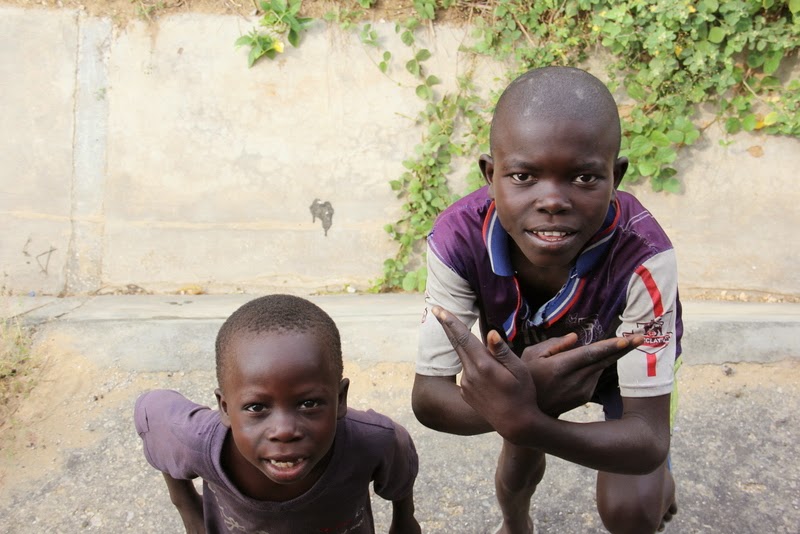 |
| Kids around the car while Marc was in the office |
On our way to the next town the French almost tipped over their car when they took the wrong road. A new road is being constructed and some parts you can drive on the new road under construction and some parts you have to drive the old road. On a part where it was not clear the French decided to take the old road and we took the new road. The iveco is a lot faster and needs more speed in the sand so the French are usually driving ahead of us when the road is sandy. We did not see them for a while and when Marc just made a remark about how far ahead the French were, we saw them almost on their side on the road next to us. They could not get out of the ditch, so we had to get the unimog to the place where they got stuck to pull them out. Fortunately no damage to the car and passengers so we could continue after about an hour.
When we reached Okoyo we were stopped by the police and we spent over an hour there while the officer took down our information and told us that he had 10 kids. He asked how many we had. So when we said we did not have any, he asked why. We told him that since he already had 10 kids if we had kids as well there would be too many kids. No, many kids is good, God wants you to have many kids, if you have many kids God loves you. So we got a whole preach about God. Obviously the missionaries are doing their work in Congo. Getting the carnet stamped was a lot easier and did not require us to listen to another preacher.
The next town was Oyo, we had another police stop. They wanted to check the inside of our car because the president was going to visit today. Oyo was definitely a nice town, with many new buildings, a nice new airport, two very nice hotels and a new airport building. For whatever reason the government put a lot of money into the town. Another surprise about Congo. It looks a lot richer than we expected. Not sure whether the money is spent on the right things, but in many towns the government buildings looked very nice. Clearly another African country that does not need development money from the west anymore.
We found a wild camping spot along the road just before it started to rain. We did not know that we we're close to a town until the next morning at 6am when we were woken up by 30 children that had gathered around our cars and started to make noise, touched the car and shouted at us. All friendly but a bit annoying, so we quickly ate our breakfast and left.
Along the road, all through Africa we have been seeing rats hanging on a stick next to the road. Apparently in many countries they are a delicacy. In Congo we saw our first monkey hanging on a stick. I guess each country has its own specialty.
We made it to Brazzaville without a problem, spent the night at Hippocampe hotel, changed money, did some car maintenance, filled up on diesel and headed out the next day. During the night in Brazzaville we had our first major rainstorm and we were anxious to get to the road between Boko and Luozi. Boko is the town were the tar road ends. From there it is 30km of bad piste to the border with DRC and then another 25 km (according to our maps) to Luozi where we want to cross the mighty Congo river.
 |
| Congo River rapids |
The road to Boko was not a problem we had a few nice views of the Congo river just outside Brazzaville. We also had one policeman waving us to stop, but Marc just waved back and drove on. Marc is a little bit fed up with the time consuming police stops, where they either want money, fill out papers, look into the truck out of curiosity or just want to chat about nothing. Experience has taught us that if you do the unexpected it takes them too long to realize what just happened to them to react. So also with this policeman. His mouth opened from astonishment and by the time he blew the whistle the French had also already passed him.
After Boko the road became very rough and we were happy that it had not rained there for a couple of days. There was not much of a road but just a rough track and some steep inclines and descends, which were no problem but would have been very dangerous when wet.
In a town after Boko we had to get our carnet stamped. The custom officer was not too pleased that he had to interrupt his lunch break for us and tried to charge us 10$ each. We refused to pay and after some arguing back and forth he gave up and let us go.
We drove on and passed the sign that we were entering Congo-Belge. So we knew that the road was at least 53 years old (Belgium Congo go their independence in 1960). That was also probably the last time that the road was maintained. It was getting dark and we found a nice wildcamp spot on top of a hill with great views in all directions. We had driven as long as we could, hoping that the worst road would be behind us. According to our calculations based on the map we were only 15km away from Luozi.
 |
| Belgium Congo: Indicating the last time the road was maintained |
The next day we drove into a town after 3km. We had to stop for a gate and wait for the immigration police to open it and let us in. The border formalities were completed pretty quickly, there was no customs office and according to the police we can do the stamping of the carnet at the border with Angola. We asked about the road to Luozi and they told us it was another 50km, the first 4 km would be bad but after that it would be a good road. We also needed to make sure we make a right at the first t-junction and not a left what apparently a French tourist did a day before and he ended up in the river with his car.
We followed the advise of the policeman however we found out that the next 46km were very bad and only the last 4km to Luozi were ok. It took us over 5 hours to drive the 50km. Again the scenery was very nice and the views of the Congo river were amazing.
In Luozi we were stopped by the police and they told us that we needed to report to the head of the police in town. We could not go straight to the ferry which was in the other direction. So we drove 4 km through town to get to the police station. There was a lady who looked at our passports for 10 minutes and then called the chief of the police. So we waited another 10 minutes. The chief wanted to have copies of the passport and a fiche with all our information. He was clearly disappointed that we had the copies ready for him. Then he sent his assistant to make more copies of our passports to town. When we asked what was going on he said that he also needed a copy of the visa. We said we also have copies of the visa with us. So he called his assistant to come back. Next they started to write all our information down on another form. By this time we already thought that this was another scheme to extort some money from tourists. And yes when they were finally done the chief wanted 10$ per person. We asked why we needed to pay and it was for all the administration and time to register us. We said that that was his job and he is not allowed to charge for that. Now we started to get into a discussion about why we think we should not pay and why he thought we should pay. Marc's patience was running thin after 5 months of African police stops and he decided to just grab the passports from the desk of the chief. The chief was taken by surprise and initially he did not know what to say. Then he said that it was not polite to just grab the passports. To which Patrick quickly replied that it was not polite to charge 10$ and we walked out of the office.
The other reason that Marc grabbed the passports was that the next ferry was leaving in 30 minutes and since we had heard that there is only space for two to three cars we thought we may have to wait a couple of trips before both trucks would be on the other side.
The timing was perfect. We arrived at the ferry and we could drive straight onto it. The ferry would never have passed any nautical requirements in Europe or the US, other than that it is floating (barely after both our trucks and a local loaded truck were on it).
It took about half an hour to cross the Congo river, which we spent pretty much haggling about the price.
On the other side the road was pretty good and we wild camped right next to the road.
The next day we drove to the tar road that runs from Kinshasa to Matadi and followed that to the town of Songololo. There is a smaller border crossing into Angola there that was supposed to be a lot easier than the one in Matadi. And indeed we did not have any issues leaving DRC. There was some confusion about the carnet de passage since we did not have an entry stamp. The funniest part however was that the European union subsidized a project to provide some DRC borders with computers and finger printing equipment (yes, European friends you can be assured that your tax dollars are put to good use). Operating the finger printing equipment was not that easy so it took about thirty minutes before all four of us were finished. We were glad that we arrived just before a big bus of Angolans.








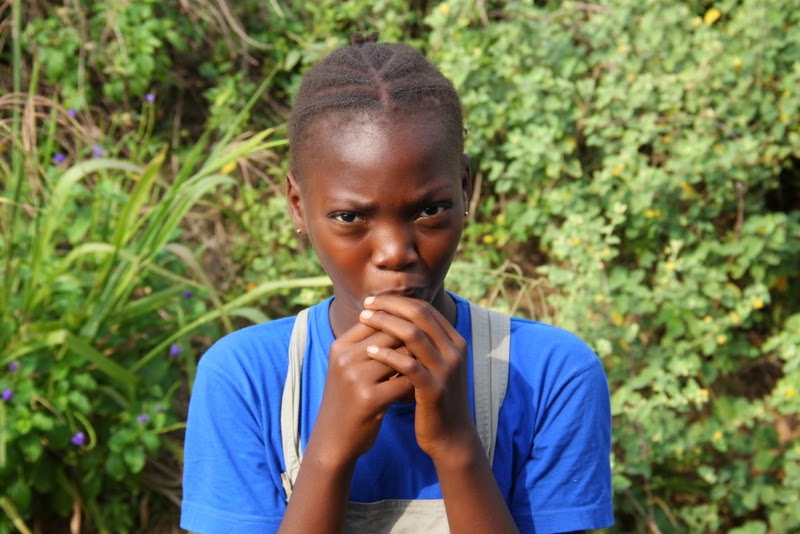




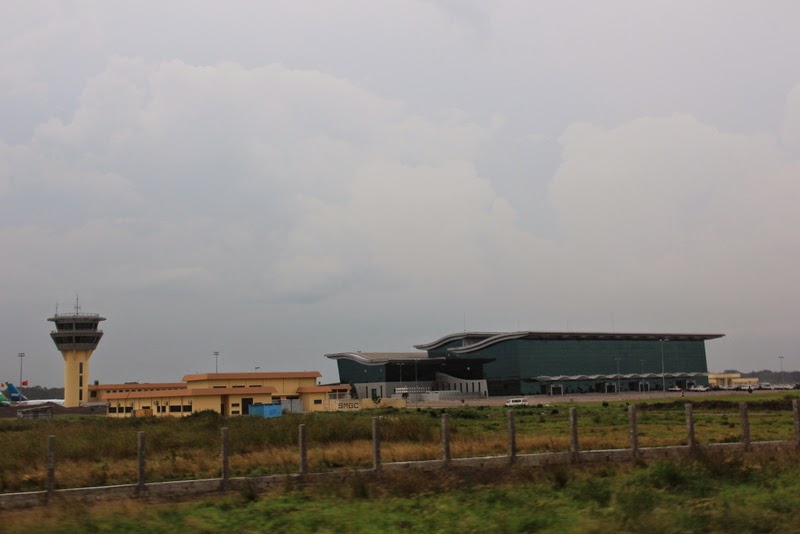


















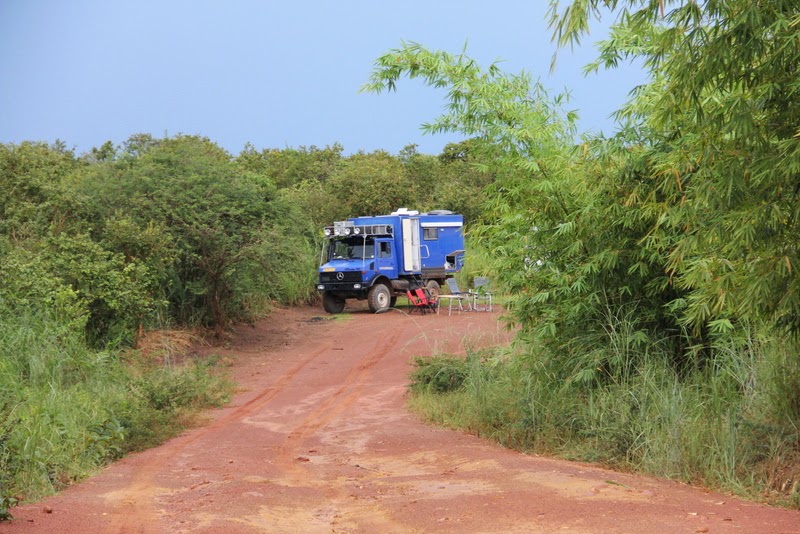
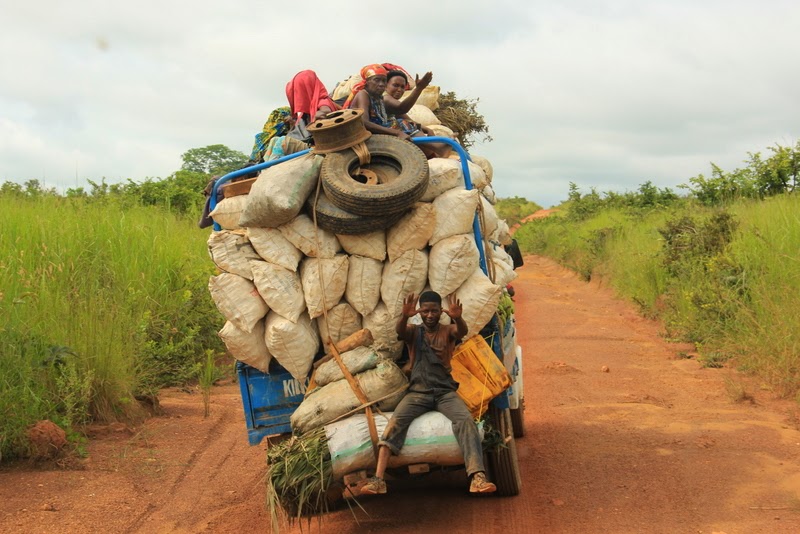

No comments:
Post a Comment